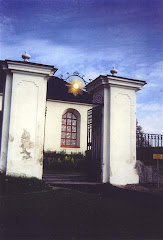How did she know where to find Him?
How did she dare to approach them?
How could she suffer the smirking?
How did she bear the reproaching?
Why did she cry when she knelt there?
Why did she give the guest welcome?
Why did she carry such perfume
Into the Pharisee’s feast room?
She washed His feet with fuller’s tears –
Then dried them with her linen hair –
Anointed them with spikenard myrrhs –
She kneaded them with utmost care:
“How beautiful upon the hills
The heels of Him who walked with us –
How wonderful among the towns
The toes of Him – that gathered dust.”
How lyrical upon her ears
The words of His clear gratitude –
Phenomenal the message of
His understanding attitude:
“This absolution for my death
Brings incense to the temple door –
Thy love is great – forgiveness thine –
Go now in peace and sin no more.”
(10 February 2009, Provo, Utah)
Wednesday, April 29, 2009
Subscribe to:
Post Comments (Atom)
.jpg)
3 comments:
Stanza 1:
tetrad interogatory
St 2:
triad interogatory
St 3:
tetrad, plus asyndeton
St 4:
double aposiopesis
St 5:
double aposiopesis
St 6:
Anacoluthon?
I especially love St 4 with the hills/heels, and the towns/toes. Sounds so wonderful when I read it!
Thank you for the stylistic identification of the key figures. To me, anacoluthon implies a grammar disjunction or collision in the clauses. I did not intend that, though ellipsis or word order could cause that. What makes it an anacoluthon for you?
I was just trying to apply what I saw on your Music Of Endorsement page. Yes, I probably got a couple wrong. I was just playing!
Very cool poem, though!
Post a Comment